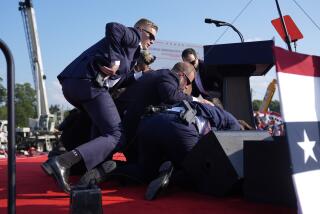Challenge for Bush Is Getting Back Among Public--Safely
- Share via
WASHINGTON — President Carter was a prisoner of the White House during the Iran hostage crisis, not traveling for half a year. During the buildup before the Persian Gulf War, President Bush decided business had to go on as usual. He drew criticism for playing golf in Maine while sending troops to Saudi Arabia.
Now, the current President Bush’s White House is wrestling with how and when he should move beyond the confines of Washington.
The issue involves more than presidential restlessness or mere logistics. It goes to the heart of what impact the crisis will have on his presidency. It also speaks to how he can communicate his goals to Americans and, with an eye on locking up international support, to the rest of the world.
During the first eight months of his presidency, Bush was on the road nearly half the time, if visits to his ranch near Crawford, Texas, are counted. Often, the trips were built around speeches on one facet or another of his domestic program. With the exception of two weekends at the Camp David presidential retreat in Maryland and a quick trip to New York City, he has remained in Washington since Sept. 11.
Now, if he wants to dramatize his message with events beyond the Rose Garden, he has to find the right audience to match his agenda. Given extreme security concerns after the attacks two weeks ago when four hijacked airliners were turned into flying bombs--with Air Force One a target, the White House has insisted--officials also are suggesting that presidential travel now requires unusually tight secrecy.
So, where does Bush go, and how does the White House go about the business of bringing the president to the people?
Bush, of course, has had no trouble drawing attention to the course on which he has embarked. The media shadows in which he operated earlier in his tenure, when his staff said he was not going out of his way to generate public attention, gave way instantly Sept. 11 and he now is a media magnet.
By noon Monday, he had spoken out twice. He drew a crowd of cameras and reporters to the White House, where he announced in the Rose Garden that he was seeking a nearly global freeze on the assets of Osama bin Laden and others the U.S. government has tied to the attacks on the Pentagon and the World Trade Center. Later, he posed with visiting Canadian Prime Minister Jean Chretien.
But as long as he remains in Washington, it is difficult for him to bring life to his message that the country must get on with its business.
“I think he will want to make sure he does get out and about sometime in the not too distant future,” said Jody Powell, who was Carter’s press secretary. “He, like the country, will have to get back to other business [as well as to the anti-terror campaign], and it will be difficult for him to communicate about anything but this because of the attention he gets from the media and the public.”
Still, Powell said, “The country needs to see him carrying on the other business of the government, and it’s going to be a challenge for him to project that message.”
Among the issues the White House faces: How to put the president on the road with enough notice in the community he will visit to draw a crowd, but not so much advance word that it makes the security task any more difficult than it might already be.
So, military bases beckon. But because presidents have invitations to address gatherings across the country on nearly any given day, Bush’s aides can decide to parachute in and find a podium for him with barely a day’s notice.
“It’s easier to shoehorn him into an event than to create one,” one White House official familiar with presidential travel said.
At the moment, there is little pressure on Bush to travel. While he does not want to appear to be a hostage to the campaign he has declared against terrorism, he does not want to seem so determined to keep the country on an even keel that he does not keep up a steady focus on the crisis.
“I don’t think he needs to go out to the country,” said Rahm Emanuel, who was one of President Clinton’s senior advisors.
But if Bush decides to travel, an appropriate event might be a grass-roots gathering of diverse citizens--Jews, Christians, Muslims and others--to demonstrate to those watching around the world that the attacks killed people from different backgrounds, and from many countries.
“If they do anything,” Emanuel said, “they can go to a home-grown, interfaith event and celebrate America’s diversity. That’s what these terrorists don’t understand about America.”
More to Read
Sign up for Essential California
The most important California stories and recommendations in your inbox every morning.
You may occasionally receive promotional content from the Los Angeles Times.













